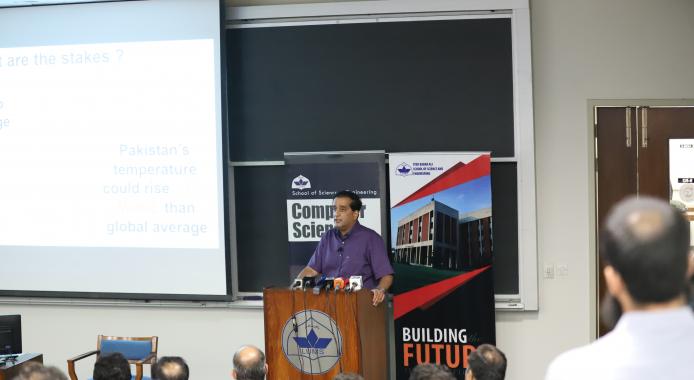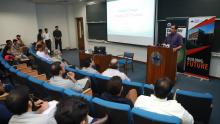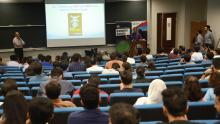
A LUMS session on ‘Climate Change Challenges for Pakistan’, led by Malik Amin Aslam, advisor to the Prime Minister on Climate Change was held on September 24, 2019. The event, held to provide an overview of the threat of changing climate patterns, the challenges it involves, as well as possible solutions, on both a national and international scale, drew a large audience, including environmental activists, students from LUMS and other academic institutions and even representatives from media houses.
Mr. Aslam began his presentation with an overview of the impact of climate change within the nation. He shared that Pakistan has substantial quantities of glacial ice in its northern regions, which is melting at an accelerating rate due to variations in climatic patterns. He argued that this melting could disturb the biodiversity of the entire country and adversely influence the climatic conditions. As the global average temperature is increasing due to climatic changes, the temperature in Pakistan can rise by 10 °C more than the global average temperature.
During the session, Mr. Aslam explained that climate change is not just adversely impacting the environment, but also the economy. He explained that Pakistan faces economic losses of USD 4 – 14 billion annually, solely due to the deteriorating climate conditions in the nation. He further shared that Pakistan is the 7th most vulnerable country due to climate change and 2nd most vulnerable country in terms of economic losses due to poor climatic and environmental conditions.
After providing an overview of the challenges, Mr. Aslam also shared the steps that the federal, municipal and provincial governments are taking to mitigate the impact of climate change. He praised the various efforts by Pakistan Tehreek-e-Insaf (PTI) in Khyber Pakhtunkhwa (KPK) such as the Billion Tree Tsunami initiative, which has increased the natural forest cover in the region by 6 percent. Other initiatives include the Nature Valuation Bill, the establishment of the National Park Management Authority and Green Mass Transit.
Mr. Aslam emphasised the role of public-private partnership in combating the challenges posed by the rapidly changing climatic situation across the globe and in Pakistan. In fact, the LUMS Energy Institute is working with the Ministry of Climate Change to introduce the National Electric Vehicle Policy with an aim to introduce an emission free transportation sector in Pakistan.
The session also emphasised that the responsibility to combat climate change also falls on individuals. Mr. Aslam highlighted that the participation of the civil society is of paramount importance. He shared that simple steps, such as limiting the usage of plastic bags, can have a tremendous impact on the environment.
The event concluded with an interactive Question and Answer session. Dr. Tariq Jadoon, Registrar LUMS, presented Mr. Aslam with a souvenir in appreciation for sharing his valuable knowledge with the LUMS community.










